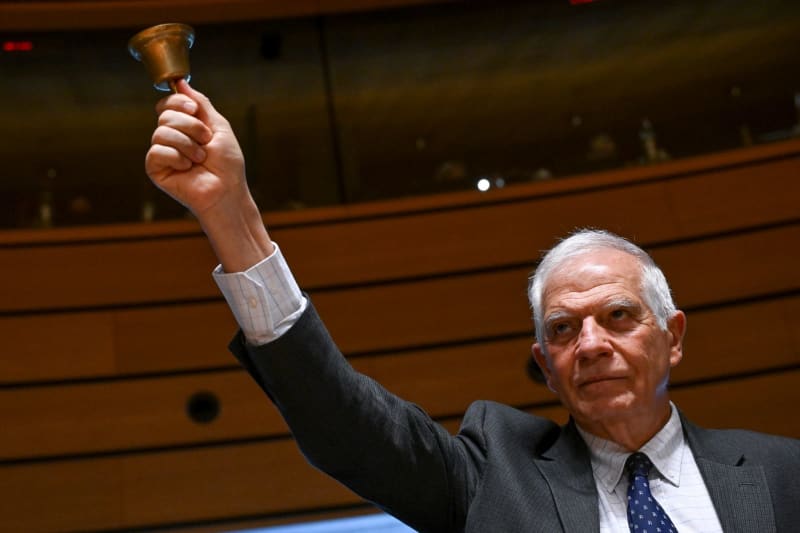EU foreign ministers approved €1.4 billion ($1.5 billion) in military aid for Ukraine, with the package to be financed for the first time by proceeds from frozen Russian Central Bank assets, top EU diplomat Josep Borrell announced on Monday.
In Moscow, the agreement was dismissed as being an ineffective plan that would end up hurting the European Union more.
“The purpose of the sanctions was to strangle the Russian economy and destroy the cohesion of society, said Deputy Foreign Minister Alexander Grushko in Moscow.
“The EU has achieved the opposite,” he said. Russia also warned of a renewed rise in EU energy prices.
Plan approval seen as key boost to Ukraine
The approval comes as a welcome boost for Kiev amid Hungary’s ongoing opposition to other packages from an off-budget fund called the European Peace Facility (EPF) worth more than €6 billion.
Each EU member state has a veto on EPF payments and Hungary has been blocking some disbursements related to Ukraine for nearly a year. A €5-billion support fund is also blocked.
EU diplomats were not expecting a breakthrough on the EPF deadlock with Hungary. As a result, Ukraine military aid from the proceeds is a useful alternative means of support.
Borrell referred to this blockade from Hungary as a “structural difficulty” in a press conference after the EU foreign ministers meeting in Luxembourg.
Careful legal footwork to enable aid
EU member states first gave their approval to use the proceeds to buy arms for Ukraine in May however it was unclear when the first payments would flow due to Hungary’s veto.
A legal analysis noted that as Hungary abstained on the decision to use the frozen assets for Ukraine, and that the new aid is derived from the Russian Central Bank assets, and not EU funds, Budapest’s veto does not apply.
Borrell said that due to Hungary’s absention, “it’s not necessary” to involve Budapest in carrying out the decision.
Hungarian Foreign Minister Péter Szijjártó slammed the move as a violation of EU rules, according to Hungarian government spokesman Zoltan Kovacs on X.
Hungary opposes military aid for Ukraine fearing an escalation of the conflict with Russia and expresses doubts about Western support for Ukraine, preferring instead to call for a ceasefire.
However, Hungarian Prime Minister Viktor Orbán has previously linked decisions on aid for Ukraine to freeing up EU funds for Hungary that have been frozen due to concerns about the rule of law.
Military and financial aid for Ukraine
The military aid for Ukraine uses the interest and other profits from the assets, but not the underlying assets themselves, which will remain frozen.
A total of 90% of the money will fund military aid, while 10% will go directly to Ukraine as financial aid.
Under the agreement, Germany and the Czech Republic have been selected as the first to use the proceeds to provide Ukraine with air defence equipment and artillery shells, EU diplomats said.
Other EU member states may administer the proceeds in the future.
According to the European Commission, around €210 billion worth of Russian Central Bank assets are frozen in the European Union.
The Brussels-based financial institution Euroclear, which holds the lion’s share of the assets, recently announced that the assets had made around €4.4 billion in interest in 2023.
EU measures target sanctions evaders
EU foreign ministers also adopted new punitive measures to crack down on sanctions evasion and stop Russia from obtaining Western technology for making weapons.
A further 69 individuals and 47 entities linked to the Russian invasion of Ukraine have been sanctioned with an asset freeze and a travel ban to the EU.
EU sanctions also targeted organizations for providing services or goods used by the Russia military based in China, Turkey, and India. Goods that may be repurposed for military uses may not be sold to these sanctioned companies from the EU.
The Russian armaments holding Vysokotochnye Kompleksy (High Precision Systems) announced that the sanctions against its companies, including a tank factory, were a sign of recognition that the military complex was working successfully. The sanctions would have no impact on weapons production in the future, it said.
Russian LNG targeted in EU sanctions first
The new salvo of sanctions target Russia’s multi-billion dollar liquefied natural gas (LNG) sector for the first time.
These punitive measures ban ports such as Zeebrugge in Belgium from shipping Russian LNG to countries outside the EU after a nine-month transition period.
Russian analysts spoke of a blow to LNG producers. However, the sanctions were comparatively soft and there was a transitional period that would allow Russian companies to find new customers and alternative routes, as was the case with the oil embargo, they said.
India and China – and the Asian region as a whole – were already benefiting from the comparatively favourable energy offers from Russia, a major raw materials power, they said.


